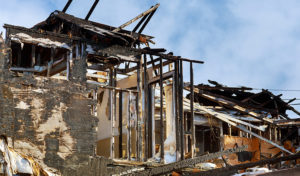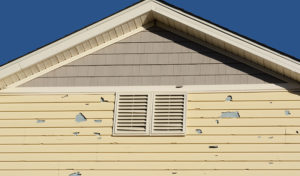HOA Insurance 101: Why Does Your HOA Need It?

Many HOA board members and residents question the importance of proper homeowners association insurance. Maintaining the correct types and limits of HOA insurance, though, offers a safety net that shields your association from unexpected and possibly disastrous losses.
Browse By Category
Sign up for Our Newsletter
Many HOA board members and residents question the importance of proper homeowners association insurance. Maintaining the correct types and limits of HOA insurance, though, offers a safety net that shields your association from unexpected and possibly disastrous losses.
What Is HOA Insurance?
No matter how hard you try to prevent them, accidents do happen. People can slip and hurt themselves in your swimming pool area, children can suffer injuries in the playground, and damages to common elements can take place. These circumstances can result in someone — a homeowner, employee, or guest — filing a claim against the HOA.
This is where HOA insurance, often referred to as an HOA master insurance policy, comes in. What is a master policy? A master policy is a type of insurance policy homeowners associations purchase to ensure coverage in case of liability expenses or repairs to common areas.
Does a Homeowners Association Need Insurance?
Homeowners associations need proper insurance coverage to protect the association itself and its members. Some states, such as Arizona, have insurance requirements for HOAs and condos. Many HOA governing documents, particularly newer associations, also establish the need for insurance.
Without HOA insurance coverage, the association will need to dip into its own funds to pay for legal fees and settlement amounts. Even if the HOA comes out of a lawsuit in victory, the costs of legal counsel and defense can still add up.
But, a master insurance policy for homeowners association does not stop there. It is also essential in the event of property damage caused by unforeseen circumstances. Some examples include earthquakes, floods, and hurricanes. Without proper coverage, the HOA will need to pay for the expensive replacements or repairs out of pocket.
What Does HOA Insurance Cover?
 A typical HOA master policy will cover two areas: Liability and property damage.
A typical HOA master policy will cover two areas: Liability and property damage.
Liability refers to expenses associated with legal action against the association. For example, if someone injures themselves on HOA property and decides to slap a lawsuit against the HOA, then the liability portion should have you covered. Defending your association from a lawsuit can be expensive, and proper homeowner association liability insurance can prevent you from imposing hefty special assessments to cover the cost.
Property damage, on the other hand, refers to physical damages to HOA buildings or common areas. For example, if a fire damages your clubhouse, and your policy covers it, then you can claim those damages. That means your insurance provider will cover the cost of repairs.
The extent of coverage can vary from policy to policy. Some offer comprehensive coverage, while others only cover the bare minimum. Not all policies, for instance, cover fires or floods. It is important to check your own HOA insurance policy to see what items are covered. From there, you can decide whether or not it is necessary to upgrade your policy.
HOA Insurance vs Condo Insurance
Navigating insurance is usually trickier when it comes to condominiums. Within the setting of a single-family HOA, there is a pretty line distinguishing which properties are covered by your homeowners association policy and which ones are covered by individual homeowner insurance. The same cannot be said for condo associations.
Within a condo setting, owners share walls, floors, and ceilings. Hence, figuring out which policy covers what item can come as a challenge. So, what does a condo association insurance policy cover?
Generally, condo owners should have their own insurance, known as HO6 insurance, to cover the interiors of their units. This works in coordination with the condo association’s own insurance, which can fall under one of two main types:
- Bare Walls Coverage. This condo insurance policy covers the structure of the condo building. It also ensures everything inside the walls, such as wiring, plumbing, and insulation. With a bare walls policy, condo owners need not worry about insuring their own walls.
- All-in Coverage. This condo insurance policy is more comprehensive, adding coverage for installed features such as countertops and appliances on top of a bare walls policy. Condo owners should check whether or not their association has this type of policy and what it covers. This way, there is no overlap.
Importance of Adequate HOA Insurance Coverage
Simply owning HOA insurance is not enough. Associations must also make sure that they have sufficient coverage for the community’s needs.
Far too often, HOAs grow complacent and feel that their liability insurance is enough to protect them, only to find out later on after an accident has happened that their policy actually does not cover it.
A majority of insurance policies renew on an annual basis. Thus, you should see to it that you review your own HOA insurance policy every year. This way, you can identify what situations are covered and determine whether or not you need additional coverage.
It is equally important to maintain a good working relationship with your insurance broker. This person is your main point of contact. In case you need to make a claim for the association or have any questions, your insurance broker is the person you call. Your broker can also assist you with HOA insurance requirements. Since your broker plays a pivotal role, you must look for someone trustworthy and someone who puts the needs of the community ahead of their own interests.
How Much Does HOA Insurance Cost?
The cost of homeowners association insurance coverage varies wildly depending on a number of factors. The size and nature of your common areas, the number of homes, and the extent of your coverage can all affect the price of your annual premiums. Location can also play a role in determining how much you need to shell out.
For small associations, a standard $1,000,000 to $2,000,000 general liability policy can cost anywhere between $57 to $79 a month. That equates to $684 to $948 a year.
Who Pays for HOA Insurance?
The cost of HOA insurance premiums is included in the monthly dues homeowners pay to the association. Homeowners get an equal share of the common areas of the HOA. Therefore, it makes sense for homeowners to divide the cost of HOA insurance equally among themselves as well.
Keep in mind that board members are not spared from paying monthly dues. After all, board members are just homeowners who have volunteered to help run the association. They don’t get special treatment.
HOA Insurance vs Homeowners Insurance
Even with an HOA master policy, homeowners will still need to purchase homeowners insurance. A typical HOA insurance policy will only cover liability and property damage to common areas. Homeowners need something that also protects the structure of their home as well as their belongings.
Some master policies do extend to homeowner property, but they are very few and far between. Homeowners should take the time to get to know the HOA’s insurance policy and what it covers. That way, they can obtain the right policy for their own homes.
What Is the Difference Between Homeowner Insurance and HOA Insurance?
While both homeowners insurance and HOA insurance offer protection, they are not one and the same. The key difference between these two types of insurance is what they cover. Homeowner insurance typically applies to the property and personal belongings of the homeowner, whereas HOA insurance applies to the property and liability of the homeowners association.
As for who pays for these policies, the answer is the homeowner. As a homeowner, you pay for your own homeowners insurance policy, as it covers your individual dwelling. HOA insurance is also paid for by the homeowners who live in the community. Homeowners have a financial obligation to pay monthly dues to the association. The HOA then uses these dues to fund the various expenses of the association, which can include insurance premiums, among other things.
What Does Homeowners Insurance Cover?
Homeowner insurance offers financial protection for dwelling and personal property damage in the event of a covered peril. Covered perils can vary from one provider to another, with the location of the home playing a key role in the policy. Most standard homeowners insurance policies, though, offer coverage for the following risks:
 Fire and smoke
Fire and smoke- Wind or hail storms
- Frozen plumbing
- Falling objects
- Water damage as a result of plumbing, HVAC systems, and appliances
- Theft
Homeowner insurance also provides liability protection. For example, if you or a family member cause bodily injury or property damage to a third party, homeowners insurance can offer coverage for lawsuits and damages. In general, homeowners insurance doesn’t cover floods or earthquakes. For those risks, you will typically need to purchase a separate or additional policy.
When it comes to coverage levels, homeowners insurance comes in three forms: actual cash value (ACV), replacement cost, and guaranteed replacement cost or value. Actual cash value pays you the amount after factoring in depreciation, whereas replacement cost covers the full cost of replacement without depreciation. Finally, guaranteed replacement cost or value covers the total cost even if it goes beyond your policy limit (usually up to 20-25% over the limit). Therefore, it is the most comprehensive.
What Does HOA Insurance Cover?
Unlike homeowners insurance, which is meant to cover an individual homeowner’s property, HOA insurance covers communal property. This policy protects the common areas and buildings of a homeowners association.
A standard HOA master policy includes coverage for the following items:
- Property Damage. HOA insurance can pay for the cost of repairs in the event common elements suffer damage due to a covered peril.
- Liability. If a guest becomes injured on HOA property, the master policy can cover the cost of legal and medical fees.
As with homeowner insurance, HOA insurance can vary in terms of covered risks. Again, location can play an important role in determining what is covered.
Homeowners Insurance vs Condo Insurance
It is easier to define and insure the common areas in homeowners associations consisting of detached homes. But, in condo associations where a lot of elements are shared, the distinction isn’t always so clear-cut. As such, condo insurance typically comes in three forms:
- Bare-walls Coverage. This covers the structure itself, along with the wiring, plumbing, and insulation of an owner’s condo unit.
- All-in Coverage. This offers bare-walls coverage but with added protection for appliances, countertops, and other built-in items.
- Special Entity Coverage. This covers all property inside individual condo units but not structural modifications or additions.
As with HOA and homeowners insurance, condo owners best purchase their own individual condo insurance. First, owners should find out what their condo master policy already covers. This will help them make a decision on what policy to buy for themselves. Just like homeowners insurance, personal condo insurance offers coverage for liability as well as personal items.
How Much Does Homeowner Insurance Cost?
The cost of homeowners insurance will depend on a number of factors. These include your location, your home value, the condition and age of your home, the coverage amount, and the provider you choose. For instance, homeowners living in areas with a high crime rate generally have to pay more for home insurance due to the higher chance of theft. Additional coverage or “riders” can also affect the cost of your insurance premium.
On average, though, homeowners pay somewhere between $1,300 to $1,700 per year for home insurance. While the cost may seem expensive at first glance, it’s basically nothing compared to the expenses you will incur to repair a damaged home or pay for liability. As such, homeowners insurance is definitely a good investment to make.
How to Get Homeowners Insurance
 When looking for homeowners insurance, the first thing you need to do is determine your needs. What is it that you want to cover? And how much coverage do you need? This will, of course, require some calculations on your part. Determine how much it will cost to rebuild your home, and don’t forget to include the cost of your personal belongings, too. In doing so, you can set a realistic coverage amount.
When looking for homeowners insurance, the first thing you need to do is determine your needs. What is it that you want to cover? And how much coverage do you need? This will, of course, require some calculations on your part. Determine how much it will cost to rebuild your home, and don’t forget to include the cost of your personal belongings, too. In doing so, you can set a realistic coverage amount.
Next, shop around. Looking for the right homeowner insurance company takes work. And while you will find many online, don’t go with just the first or cheapest one. Cheap homeowners insurance does exist, but such policies usually don’t provide sufficient coverage. To better compare your prospects, ask each company to provide you with a homeowner insurance quote.
It’s also a good idea to do some research on every candidate. Look for online reviews and references. See what other customers have to say about their services and claims process. Some companies make customers jump through hoops just to get a single claim approved. You don’t want that.
After gathering enough data, it’s time to make your choice. Keep in mind that, in the end, the best homeowners insurance is the one that fits your needs and standards.
Other Essential Insurance Policies
Your master policy, while comprehensive, is certainly not enough on its own. There are other liabilities you need to ensure coverage for. Apart from a homeowners association master insurance policy, what other policies are essential to an HOA?
1. Property Value and Replacement
 Most governing documents require associations to be insured for a minimum value. In most cases, that is the full replacement cost of the property. There are three types of building ordinance coverages, namely Contingent Liability, Demolition, and Increased Cost of Construction.
Most governing documents require associations to be insured for a minimum value. In most cases, that is the full replacement cost of the property. There are three types of building ordinance coverages, namely Contingent Liability, Demolition, and Increased Cost of Construction.
- Contingent Liability. This type of insurance covers undamaged portions of the property. As such, if a portion of a building becomes damaged, the insurance coverage will cover the cost of replacing that portion.
- Demolition. As its name suggests, this type of insurance covers the cost of demolition.
- Increased Cost of Construction. This type of insurance covers building code upgrades or the increased cost of construction. As such, if local ordinances require a damaged building to have certain upgrades once reconstructed, this policy should provide the HOA with coverage.
2. Property and Casualty Insurance
What is property and casualty insurance? It is an umbrella term, with many types of insurance falling under it. For homeowners, the form of property and casualty insurance relevant to them is homeowners insurance.
As a form of property and casualty insurance, homeowners insurance covers the homeowners’ personal belongings after a covered incident takes place. It also covers expenses related to an accident resulting from the negligence of the homeowner.
For example, if a guest becomes injured on the premises of the homeowner’s property because the homeowner failed to fix their damaged stairs, this form of insurance can pay for the injured’s medical bills, loss of income, and pain and suffering. In addition to these expenses, property and casualty insurance can also come into play if the injured decides to sue the homeowner. The insurance should cover the cost of legal fees.
What Does Property and Casualty Insurance Cover?
In general, this form of insurance offers coverage for property damage and liability. Let’s break these down further below.
Property Coverage
Homeowners insurance typically comes with property coverage. In fact, for many homeowners, this form of coverage is the most important. Property coverage protects the homeowner’s personal belongings in the event of a covered peril.
For instance, if water damage occurs on the property and damages the homeowner’s computer, property coverage can help pay for the cost of repairing the water damage as well as the cost of replacing the broken computer. This is, of course, if water damage is a peril covered in the policy. Some policies may even cover theft and vandalism.
Keep in mind, though, that not all accidents or events may be covered in a standard policy. Some policies exclude perils like floods and fires, especially if those are more common in the area. Other names for property coverage include coverage C, personal property coverage, contents insurance, and personal belonging coverage.
It is wise for a homeowner to purchase extra coverage, known as scheduled personal property coverage. This added coverage helps pay for the cost of more valuable items like jewelry.
Casualty Coverage (Liability)
 A standard homeowners insurance policy also usually offers casualty coverage. Also known as coverage E and liability insurance, this form of coverage protects the insured from paying expensive medical and legal fees.
A standard homeowners insurance policy also usually offers casualty coverage. Also known as coverage E and liability insurance, this form of coverage protects the insured from paying expensive medical and legal fees.
Should someone get injured on the property, the homeowner will not have to worry about paying the injured’s medical expenses. If that person sues the homeowner, casualty coverage can also cover attorney’s fees and court costs. Other things this coverage can pay for include lost income and even death benefits.
Other Forms of P&C Insurance
Homeowners insurance is one of the most common types of property and casualty insurance. Apart from HOA insurance and condo insurance discussed above, there are also other types, though they may not necessarily relate to all homeowners.
- Renters Insurance
 Renters insurance is another type of property and casualty insurance. But, this time, it applies to renters. Renters insurance helps protect the personal belongings of the renter, such as electronics, furniture, and the like. This is the property coverage part of the policy.
Renters insurance is another type of property and casualty insurance. But, this time, it applies to renters. Renters insurance helps protect the personal belongings of the renter, such as electronics, furniture, and the like. This is the property coverage part of the policy.
This type of insurance also normally comes with some form of liability protection. If the renter is responsible for a guest’s injuries within the rented premises, renters insurance can help pay for the cost of medical and legal fees. While not all policies have it, renters insurance can also pay for living expenses should the renter need to relocate temporarily as a result of an uninhabitable rental property.
Some landlords require renters to purchase renters insurance in order to lease their property. Landlord insurance, while offering much of the same protections, does not cover renters or their belongings.
- Landlord Insurance
For landlords, landlord insurance is a must. This insurance policy offers both protection when it comes to property damage and liability. Again, it helps pay for the building’s repairs as a result of a covered peril as well as any medical or legal expenses associated with a casualty that takes place on the premises.
It is worth noting that homeowners insurance does not typically apply to rental properties, even if the landlord technically owns the home. Since the property generates rental income, landlord insurance is necessary. Though, landlords can ask their insurance providers to see if they can work something out.
3. D&O Insurance
When homeowners become disgruntled and pursue legal action against the HOA, nothing is stopping them from naming individual board members in their lawsuit. Should that happen, the Directors and Officers (D&O) insurance provide coverage for both the association and its board members. In some cases, D&O insurance, also known as HOA board insurance, can even cover HOA committee members or personnel.
4. HOA Workers’ Comp Insurance
Workers’ compensation insurance, or workers’ comp for short, is a type of insurance that provides wage replacement and medical benefits to employees that injure themselves while on the job. In exchange, employees waive their right to sue their employer for the tort of negligence.
Homeowners association workers’ comp insurance is pretty much the same thing, only the employer in the scenario is the HOA. Some might think that HOAs don’t need workers’ comp because it doesn’t employ workers. But, even an HOA with just a functioning board and a management company will need this form of insurance.
Why is HOA workers’ comp insurance important?
For one thing, homeowners associations often work with vendors. These vendors employ workers who can get injured while performing a job. And although they are technically employed under the vendor, injured workers can also sue the HOA for the injury. This usually happens if the vendor doesn’t have appropriate worker’s comp or allows their policy to lapse.
Another reason workers’ comp is vital to an HOA is it can cover volunteers, too. There is a common misconception that workers’ comp can only apply to paid workers. And while a majority of standard policies follow this format, there are workers’ comp policies that also cover unpaid or volunteer employees. This includes board members and committee members. To ensure the HOA’s workers’ comp policy covers volunteers, too, it is imperative to work closely with the insurance provider.
Workers’ Compensation Insurance for HOAs: Is It Mandatory?
It is widely known that many states require businesses to have workers’ comp. In some states, workers’ comp becomes mandatory when a business reaches a certain number of employees. In others, workers’ comp becomes mandatory when a business hires their first employee. For example, California law requires all employers to purchase no-fault workers’ comp for all employees, even if there is only one employee. In North Carolina, workers’ comp is mandatory if an organization employs three employees.
But, do these laws apply to homeowners associations as well?
Although HOAs operate much like a business, they are not usually treated like one. As such, workers’ comp is an optional form of coverage for HOA and condo communities. That being said, every homeowners association should have sufficient workers’ comp coverage to protect itself from liability.
There is no state-mandated coverage amount for workers’ comp. The coverage amount will depend on the size of the community, how many vendors the HOA employs, and how many workers or volunteers HOAs have. It is a good idea that HOAs talk to their insurance provider to determine the best HOA workers’ compensation insurance coverage for their community.
Does the HOA Management Company’s Insurance Cover the HOA?
Many homeowners associations hire HOA management companies to help maintain the community. And, these HOAs often skip workers’ comp because they mistakenly believe their management company’s policy extends to them as well. After all, isn’t the HOA management company the one responsible for hiring and handling vendors, contractors, and all association employees?
But, the fact of the matter is that an HOA management company’s workers’ comp only applies to the entity or company itself. In other words, the company’s workers’ comp doesn’t cover the HOA or the board that hired them. This is true in most states. As a result, associations will still need to purchase their own HOA workers’ comp insurance.
Should Vendors and Contractors Also Have Insurance?
 Homeowners associations usually can’t operate alone. They need the help of contractors and vendors to perform different jobs, such as landscaping, pressure washing, repairs, and the like. There is always a risk, though, associated with hiring vendors.
Homeowners associations usually can’t operate alone. They need the help of contractors and vendors to perform different jobs, such as landscaping, pressure washing, repairs, and the like. There is always a risk, though, associated with hiring vendors.
If they are not insured with workers’ comp and an employee of theirs becomes injured, most states will consider the injured worker as an employee of the HOA. Thus, there is essentially a transfer of liability.
When this happens, the injured worker can sue the HOA for damages. And, if the HOA doesn’t have proper coverage, it can suffer serious financial loss. This will often force associations to tap into their reserves or levy special assessments to cover the cost of liability. Neither scenario is favorable.
- Licensed But Uninsured
People often hear about the importance of hiring a licensed and insured vendor. But, what if a vendor is only licensed but not insured?
Typically, licensed vendors retain the injured worker as an employee. This means that the homeowners association will not suddenly become their employer. The injured worker can then bring action against their employer (the vendor).
Sometimes, though, a court may find that the injured worker has dual employment. In this case, both the vendor and the HOA share liability. Having proper HOA workers’ comp insurance limits the injured employee’s legal options.
- Lying to Get Hired
Unfortunately, some HOAs fail to properly screen vendors. Other times, vendors will blatantly lie about having insurance just so they land the job. These HOAs can end up hiring vendors who lack proper insurance, including workers’ comp.
To protect themselves from liability, HOAs must do their due diligence when hiring contractors and vendors. It is important to ask for a Certificate of Insurance that also proves the vendor has workers’ comp coverage. If a vendor fails to provide this certificate, an HOA should not hire them.
- Insured But Lapsed
Sometimes, a vendor will have workers’ comp insurance at the time of hiring but allow their policy to lapse. When a policy lapses, it is no longer in effect. As such, if something happens, the vendor will not have the proper insurance to cover workers’ compensation. Thus, it is best to ask vendors to show proof of insurance on an annual basis. Homeowners associations should also make sure they have HOA workers’ comp insurance.
- Screening Subcontractors
Some vendors hire subcontractors to carry out other jobs. Uninsured subcontractors, though, can result in the same problem for HOAs. As such, associations should require vendors to inform them first if they intend to hire subcontractors. Then, the HOA should perform the same due diligence.
Coverage Considerations
Standard workers’ compensation insurance provides coverage for General Liability. However, this type of coverage usually does not cover the damages for bodily injury to an employee. If the industrial commission recognizes a contractor’s employee to be the HOA’s employee, the HOA may not have sufficient protection. As such, it is a good idea to take out an “If Any” Worker’s Comp policy that also includes a Voluntary Compensation (VC) Endorsement.
The National WC Program, designed specifically for community associations, offers a variety of coverage for risk states. In Virginia, for instance, it has paid $102,972 for a board member who fell walking the grounds and broke their knee and shoulder. In Illinois, it has paid $24,000 for a maintenance worker who fell from a ladder and broke both ankles.
Associations should expect to pay around $570 in annual premiums for the “If Any” coverage. Considering the amount the program paid in the scenarios above, the cost is well worth it.
It is also worth noting that most states legally require employers to get a coverage limit of at least $100,000 per occurrence for bodily injury and $500,000 for bodily injuries by disease. Make sure to check your state laws to find out your minimum requirements.
5. Miscellaneous Coverages
There are other types of insurance coverages that your HOA should look into. This includes Third Party Bodily Injury Coverage, Third Party Property Damage Coverage, Flood, Employment Practices Liability (if you have employees), and Coverage for Personal Injury.
Take Time to Review Your HOA Insurance Coverage
Preparation is paramount when it comes to HOA insurance. As a board member, you want to ensure your policy provides your association with adequate coverage in the event of damage or loss. Some people might scoff at insurance, deeming them unnecessary or trivial. But, the fact of the matter is, insurance is essential and one worth spending money on.
If you need help managing your insurance policies, it may be time to hire an HOA management company. Finding one that best suits your needs and budget begins with our online directory. Start your search today!
RELATED ARTICLES:
- The Immense Importance Of Natural Disaster Insurance For Your HOA
- Everything You Need To Know About Condo Insurance
- Can Homeowners Sue HOA Board Members Or The Condo Board?
Trending Now
Related Article
Sign up for Our Monthly Newsletter
Sign up below for monthly updates on all HOA Resource















